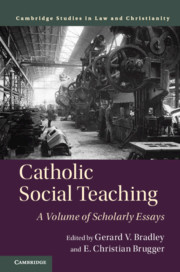Book contents
- Catholic Social Teaching
- Law and Christianity
- Frontispiece
- Catholic Social Teaching
- Copyright page
- Dedication
- Contents
- Contributors
- Acknowledgments
- Abbreviations
- Introduction Contingency, Continuity, Development, and Change in Modern Catholic Social Teaching
- Part I Historical Background
- Part II Leo XIII to Francis: The Documentary Tradition
- 3 Rerum novarum (1891)
- 4 Quadragesimo anno (1931)
- 5 Pope Pius XII on Social Issues
- 6 Development in Catholic Social Teaching: John XXIII to Paul VI
- 7 Social Teaching in Pope John Paul II
- 8 Pope Benedict XVI on the Political and Social Order
- 9 The Social Teaching of Pope Francis
- Part III Themes in Catholic Social Teaching
- Part IV Evaluative and Critical Reflections
- Bibliography
- Index of Names and Subjects
- Index of Ecclesiastical Texts
6 - Development in Catholic Social Teaching: John XXIII to Paul VI
from Part II - Leo XIII to Francis: The Documentary Tradition
Published online by Cambridge University Press: 12 July 2019
- Catholic Social Teaching
- Law and Christianity
- Frontispiece
- Catholic Social Teaching
- Copyright page
- Dedication
- Contents
- Contributors
- Acknowledgments
- Abbreviations
- Introduction Contingency, Continuity, Development, and Change in Modern Catholic Social Teaching
- Part I Historical Background
- Part II Leo XIII to Francis: The Documentary Tradition
- 3 Rerum novarum (1891)
- 4 Quadragesimo anno (1931)
- 5 Pope Pius XII on Social Issues
- 6 Development in Catholic Social Teaching: John XXIII to Paul VI
- 7 Social Teaching in Pope John Paul II
- 8 Pope Benedict XVI on the Political and Social Order
- 9 The Social Teaching of Pope Francis
- Part III Themes in Catholic Social Teaching
- Part IV Evaluative and Critical Reflections
- Bibliography
- Index of Names and Subjects
- Index of Ecclesiastical Texts
Summary
This chapter concerns developments in Catholic social teaching during the eventful pontificates of St. John XXIII (1958–63) and St. Paul VI (1963–78), including the work of the Second Vatican Council (1962–65). The period was one of fast-moving social, political, and economic change. Pope St. John continued a change in emphasis already underway in the Church’s understanding of political authority, moving further away from the sort of sacral authority emphasized still by Pius XI to an emphasis on the natural moral law. He also treated the phenomenon of socialization and continued an emphasis on the dignity of the human person and a full-throated embrace of human rights. This was continued by the Council and by Paul VI, who was increasingly concerned with development in the global south and the relationship between economic problems and political violence. This period also saw the application of the doctrine of the universal destination of goods not only to individual persons but to nations as well. Both popes and the council fathers worked to develop the tradition while grappling with seemingly intractable challenges posed by secularization in the developed world and poverty and violence in the developing world as well as the climax of the Cold War.
- Type
- Chapter
- Information
- Catholic Social TeachingA Volume of Scholarly Essays, pp. 136 - 165Publisher: Cambridge University PressPrint publication year: 2019



